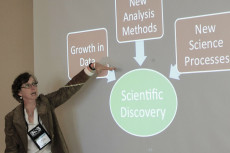Yelick Addresses National Science Bowl Contestants
May 1, 2015

Dr. Kathy Yelick gives a talk on saving the world through computing at the Science Day program during the 2015 National Science Bowl competition. (Photo by Dennis Brack, U.S. Department of Energy, Office of Science)
Every spring, 16 teams of high school students converge on Washington, D.C., to compete in the National Science Bowl after winning their regional competitions. The four-day event coincides with National Science Day and this year, Computing Sciences Associate Lab Director Kathy Yelick was an invited speaker for the event. Yelick presented “Saving the World with Computing,” in which she explained how scientific computing is tackling some of the globe’s biggest challenges.
Leading up to the finals in Washington, more than 9,500 high school students and 4,500 middle school students competed in 70 high school and 50 middle school regional Science Bowl tournaments. Each team consists of four students, one alternate and a teacher who serves as an adviser and coach. These teams face-off in a fast-paced question-and-answer format, being tested on a range of science disciplines. Among the finalists at this year’s competition was Yelick’s alma mater, Valley High School in West Des Moines, Iowa.
DOE created the National Science Bowl in 1991 to encourage students to excel in mathematics and science and to pursue careers in these fields. More than 250,000 students have participated in the National Science Bowl throughout its 25-year history, and it is one of the nation’s largest science competitions.
About Computing Sciences at Berkeley Lab
High performance computing plays a critical role in scientific discovery. Researchers increasingly rely on advances in computer science, mathematics, computational science, data science, and large-scale computing and networking to increase our understanding of ourselves, our planet, and our universe. Berkeley Lab’s Computing Sciences Area researches, develops, and deploys new foundations, tools, and technologies to meet these needs and to advance research across a broad range of scientific disciplines.







 Instagram
Instagram YouTube
YouTube